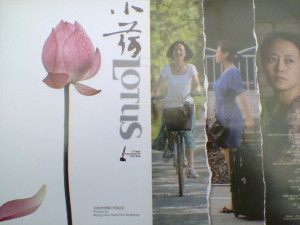Lotus
小荷
China, 2012, colour, 16:9, 91 mins.
Director: Liu Shu 刘姝.
Rating: 3/10.
Simplistic drama of a young female “rebel” fails to convince on a dramatic level.
Northern China, the present day. Zhou Xiaohe, aka Lotus (Tan Zhuo), 25, is a high-school teacher in a small town. Her parents (Xing Zhendong, Yuan Ye) are trying to match her off with a young policeman, Haitao, but unbeknownst to them she already has a married lover, Li Weifeng (Guo Tao). Already told off by the school’s head (Xu Ling) for not sticking to the national syllabus in her classes, Zhou Xiaohe is one day confronted at the school by Li Weifeng’s wife, Gu Yanhong (Zhou Yanshan), who has found out about their affaire. Zhou Xiaohe resigns and takes the train to Beijing, to start a new life. There she finally gets a job as a reporter but starts to chafe under its restrictions. One night in the street she’s harrassed by a drunk who claims he’s a policeman and accuses her of being a prostitute. To find some security in her life, she starts dating a well-off businessman, Liu Xiangdong (Xu Mingzhe), who has a Beijing residency permit; but she can’t make up her mind whether to commit to him.
REVIEW
On a technical level, this first feature by Shandong-born writer-director Liu Shu 刘姝, 36, has none of the stylistic affectations that mar so much of Mainland “independent” film-making. But at a script level Lotus 小荷 is manipulative, unconvincing and with an agenda that overrides any kind of sympathy for its protagonist. Liu’s intention, as stated in a Director’s Note that seems directly pitched at western festival audiences, was to make “an anguished cry for China’s defeated youth…a movie about young people’s painful journey from idealism to surrender…[as] they were crushed by the market, by the government, and eventually faded into a mundane life… In totalitarian China, people have few alternatives to conforming to the government’s rule[s].” Whatever. In practice, the film hardly lives up to her lofty intentions: it’s basically an episodic, poorly written drama about a self-obsessed young woman who moves to the Big City and finally sells out her (vaguely expressed) ideals.
The well-gauged performance of Tan Zhuo 谭卓 – the girlfriend in Spring Fever 春风沉醉的夜晚 (2009) and deaf-mute in Mr. Tree Hello! 树先生 (2011) – gains the movie an extra point, but even Tan can muster little sympathy for the title character as she engineers her own demise in one job after another (teacher, journalist, waitress) through sheer stubbornness and inflexibility. If Liu’s script had explored the character’s personality more, rather than expecting the viewer to accept it at face value, Lotus might have worked better at an emotional level. Instead, it simply constructs brick walls for her to crash into, climaxed by a risible situation involving a drunken policeman and his subsequent revenge. Liu, who describes her protagonist as “an awakened intellectual” who “as a woman in a male-dominated world is vulnerable and helpless”, has constructed a character with as simplistic a world-view as her own. As a movie, it just doesn’t work, and as “an anguished cry” it’s non-existent, especially when accompanied by syrupy songs.
Summery HD photography by Zheng Yi 郑忆 around Chicheng county, Hebei province, for the countryside scenes, and cooler photograpy in Beijing itself, is okay, as is editing by Liu and Guo Hengqi 郭恒奇.
CREDITS
Produced by Beijing Hour Hand Film Workshop (CN).
Script: Liu Shu. Photography: Zheng Yi. Editing: Liu Shu, Guo Hengqi. Music: Wu Hongfei. Songs: Wu Hongfei. Art direction: Tao Li. Costumes: Zhang Juan. Sound: Lou Kun.
Cast: Tan Zhuo (Zhou Xiaohe/Lotus), Luo Kang (policeman), Guo Zhongyu (student), Xu Mingzhe (Liu Xiangdong), Yuan Ye (Zhou Xiaohe’s mother), Xing Zhendong (Zhou Xiaohe’s father), Xu Ling (head teacher), Guo Tao (Li Weifeng, Zhou Xiaohe’s lover), Zhou Yanshan (Gu Yanhong, Li Weifeng’s wife), Wu Hongfei (friend at hostel).
Premiere: Venice Film Festival (International Critics’ Week), 6 Sep 2012.
Release: China, tba.
(Review originally published on Film Business Asia, 9 Sep 2012.)
